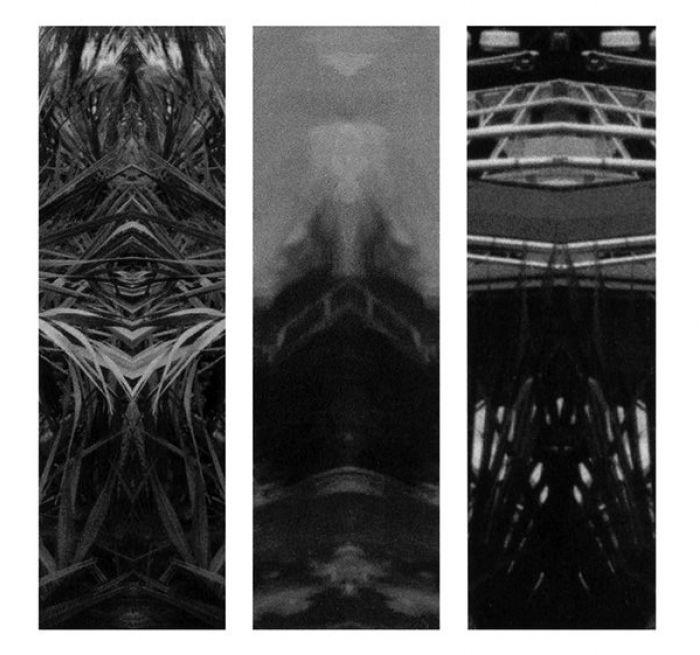A Sectioned Beam by Lansing-Dreiden (Review)

Whilst perusing Lansing-Dreiden’s website in preparation for this review and trying to make sense of the effusive philosophical mumbo-jumbo/propaganda that the shadowy art collective/subversive corporation/metaphysical construct dishes out to explain their art, I stumbled across something that looked curiously like a concert program — as only Lansing-Dreiden could’ve designed, of course. Although the wording was as vague and opaque as anything the outfit has put forth in the past, it did bear the distinct phrase “At last, recorded material is played by live hands.” Upon reading that, there was a part of me that finally breathed a sigh of relief because maybe — if they actually do tour — I might get an answer or two.
As I’ve sat here listening to Lansing-Dreiden’s music, specifically A Sectioned Beam, their follow-up to last year’s The Incomplete Triangle, I’ve found myself becoming more and more curious as to my reactions toward their music, questioning my motives for listening as well as my interpretations and reactions.
Don’t get me wrong — I absolutely the love the sound that Lansing-Dreiden has going on here, or rather, the multitude of sounds. Every time I listen to the EP, I get sucked into their chimerical music. Every time they seamlessly blend sunny psych-pop a la The Association with Boo Radleys-esque guitar swells (“Locks In Shadows”), or weave Cure-ish guitar melodies into layers of soaring vocals (“A Sectioned Beam”), or conjure up the ghosts of Fine Young Cannibals (yes, those Fine Young Cannibals) and make them play nice with the ghosts of The Thompson Twins (“The First Response”), it works so freakin’ well for me every single time.
Indeed, the group’s skill at blending and synthesizing so many genres and sounds and yet still maintain a consistent tone and atmosphere borders on preternatural, and such skill is certainly worthy to be praised in my book. But as I’ve listened to it more and more, I’ve found myself wondering “to what end?”
One of the things that I love most about Lansing-Dreiden’s music is how well it synthesizes and replicates everything I love about music, the best and brightest from some of my favorite genres. Want shoegazer-y guitar tones? Check. Psychedelic meanderings? Check. Trashy, noisy garage rock? Check. Ultra-clean, ultra-crisp synthpop? Check. Mopey, tragedy-laden goth? Check.
However, a question keeps coming up. Do I like Lansing-Dreiden’s music because, in the process of synthesizing such disparate and favorite sounds of mine, it develops its own intrinsic quality and beauty? Or do I like it simply because it reminds me of stuff I like? I know that to many, such distinctions probably seem rather foolish and trivial. If it sounds good, it sounds good, and that’s all that matters, they would probably reason. Indeed, I came to a pretty similar conclusion in my review of The Incomplete Triangle.
But as I’ve listened to A Sectioned Beam time and again, I’ve come to realize that that statement just doesn’t quite cut it for me anymore. I still love the sounds, but is there anything to love behind and beyond the sound? The group, which is notorious for its cryptic nature, doesn’t help too much, preferring to answer honest queries concerning its intentions with such statements as “All Lansing-Dreiden projects are fragmentary, mere stones in a path whose end lies in a space where the very definition of ‘path’ paths.” Which sounds really smart and cool, until you try to figure out what it really means. Which is the very quandary I’ve begun to find myself in concerning the group’s music.
Considering the group’s nature, it wouldn’t surprise me if this… ambiguity is all part of some grand art project meant to challenge conventional notions of pop music, reveal the hypocrisy inherent in genre conventions, or some other “thesis.” (Or maybe it’s just a nefarious scheme meant to get critics writing reviews as obtuse and convoluted as something Lansing-Dreiden would write.)
Which is why part of me is curious, and perhaps even hopeful, for their concert plans (if that is what they really are). Perhaps seeing the band perform, or at least hearing about it, might reveal the genuine conviction (or lack thereof) in the group’s music, something beyond mere academia and artsy-fartsiness. And it might just settle a question that’s been bouncing around in my subconscious for quite some time now.